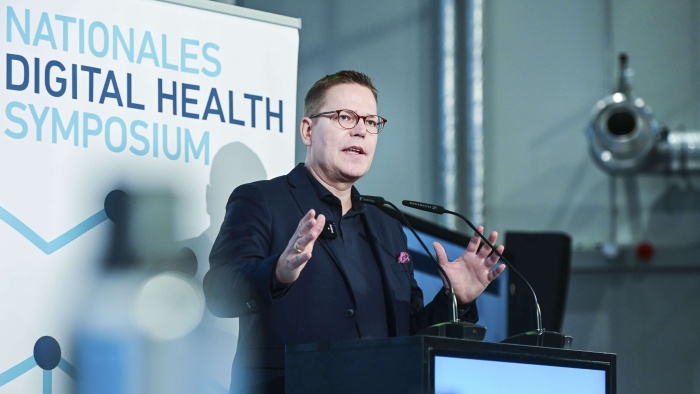Unity for the Digital Transformation in the Healthcare System
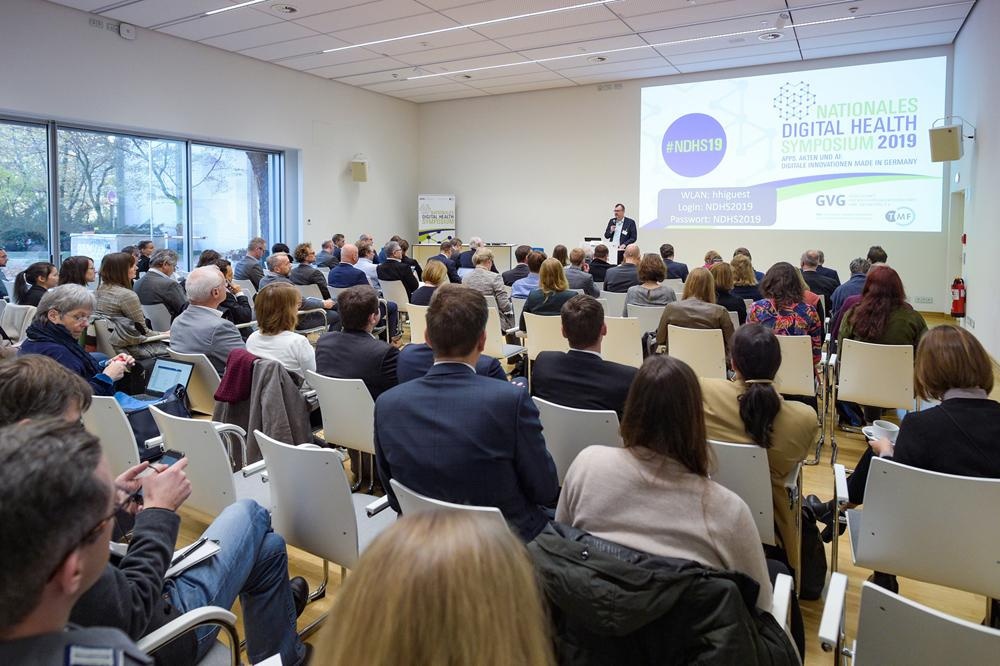
View into the auditorium of the National Digital Health Symposium 2019. © TMF
Digitalization is a great opportunity for more patient benefit through better information and research, as well as more efficient processes for the learning healthcare system - this is the conclusion drawn by representatives from research and science, service providers, statutory and private payers, startups, and industry associations, as well as politics and patient organizations, who gathered yesterday for the 1st National Digital Health Symposium in Berlin. The fully booked event at the Fraunhofer Heinrich-Hertz Institute, which had been booked for weeks, was under the motto "Apps, Files, and AI: Digital Healthcare Innovations Made in Germany?" and focused on the recent acceleration of digitalization in the healthcare system.
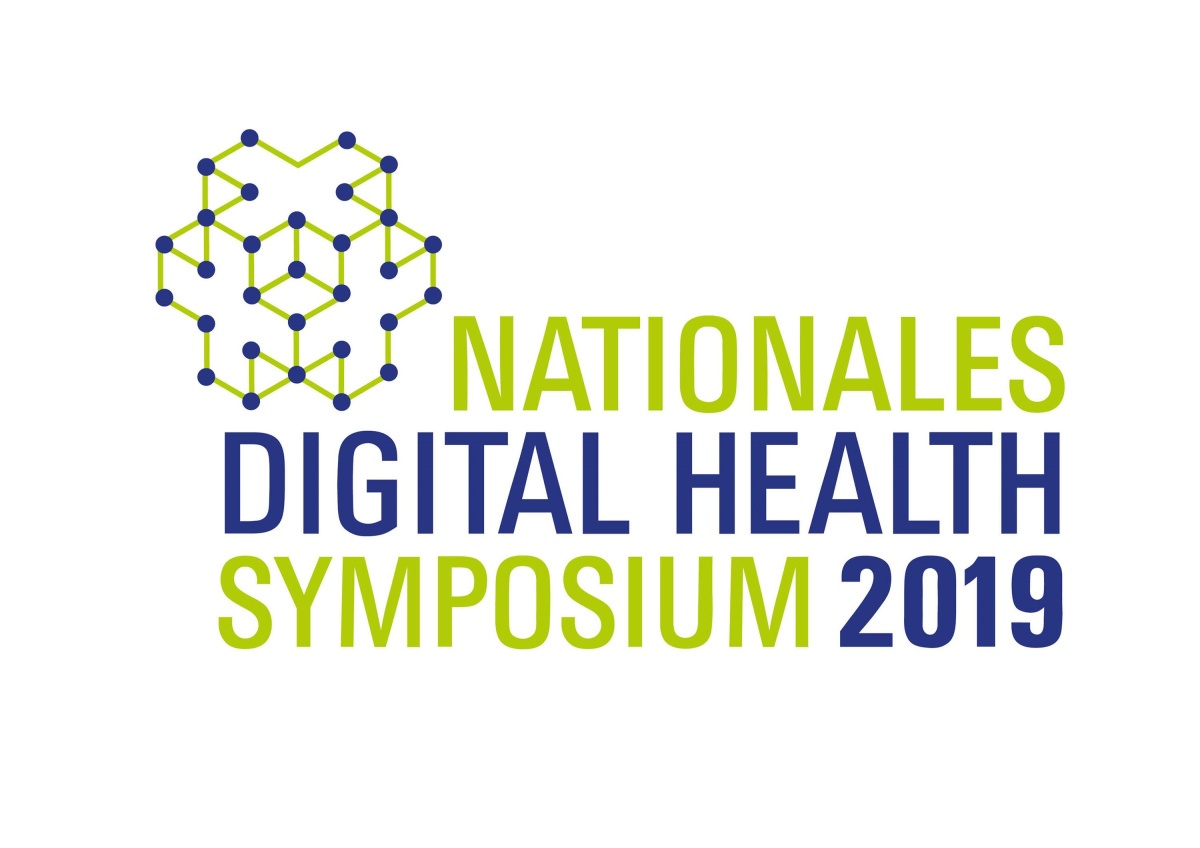
Prof. Dr. Dr. Christian Dierks (Dierks+Company), speaking on behalf of the GVG Workgroup on Digitalization and eHealth, expressed the expectation that doctors and patients would now take advantage of the new opportunities provided by the Digital Care Act: "As a result, more efficient use of data can directly contribute to the improvement of care and research." According to his opinion, both the federal and state governments are also obliged to create a uniform "research data protection space" and to overcome the "patchwork quilt of federal-state competencies."
The TMF’s Managing Director Sebastian C. Semler emphasized in his opening remarks the shared responsibility of all actors: "The great response to our new event format shows that we have struck a nerve with the networking of service providers, payers, patient representatives, and medical research. The recent debate on the use of billing data from our healthcare system for medical research has made it clear: In addition to shaping a trusted legal framework, concrete steps are needed to ensure the necessary societal acceptance. The involvement of patients in data use and project planning will play an important role."
Consciously, the organizers, represented by the chair of the BAG Self-Help, Hannelore Loskill, placed the patients’ perspective at the beginning of the conference. "Patients must be able to rely on the safety and benefit of apps," said Loskill. Affected individuals often want to contribute their data to future research but are uncertain in the face of current discussions. Clear guidelines and the presentation of the results achieved are needed to regain the necessary trust.
Patients must be able to rely on the safety and benefit of apps.
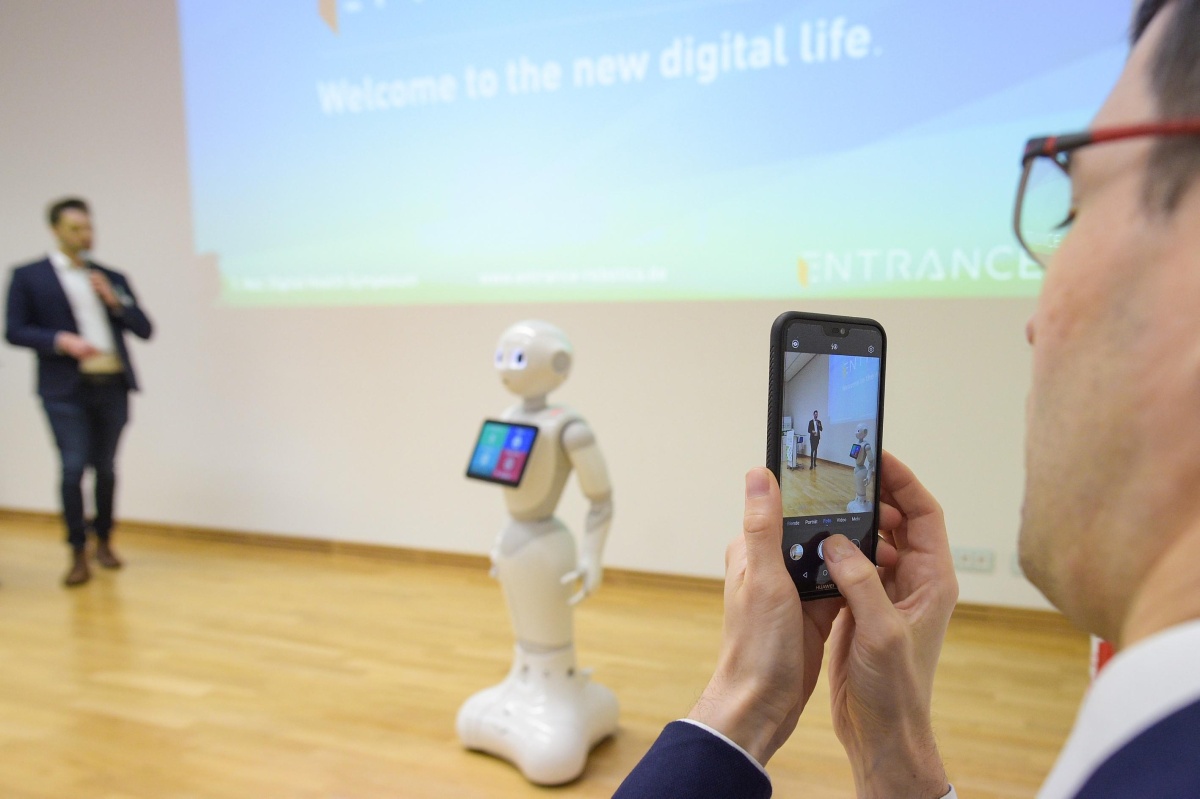
The secret star of the National Digital Health Symposium 2019: The Robot "Pepper." © TMF
Bringing Innovations into Routine Care Faster
There was consensus among the panelists on the goal of making digital innovations available to patients more quickly than before. However, it was also clear that there should be no compromise on patient safety and evidence of benefits. Dr.-Ing. Wolfgang Lauer from the Federal Institute for Drugs and Medical Devices emphasized that all "apps on prescription" would already be approved as medical devices before a trial phase in terms of safety and function. To provide decision-making aids to doctors, Dr. Johannes Bittner presented AppQ, a set of quality criteria developed by the Bertelsmann Foundation for digital health applications. According to Prof. Dr. Rainer Röhrig (University Hospital RWTH Aachen), both researchers and providers of digital health applications wished for more support, such as nationwide platform formation for competence-building, regarding the significant requirements of the new European medical product law, so that innovations could actually reach the primary healthcare market.
Dr. med. Monika Nothacker from the Workgroup of the Scientific Medical Societies emphasized the opportunities of digital guidelines as a basis for decision support based on the current state of scientific knowledge. Marcel Weigand from the Action Alliance for Patient Safety called for further offers to convey digital health literacy to patients. At the same time, he advocated for a stronger focus on unlocking national data for healthcare research. Prof. Dr. Jürgen R. Schäfer from the Center for Undiagnosed and Rare Diseases highlighted the potential contribution of a systematic review of billing data in terms of discovering co-morbidities and individual causes of diseases. The Medical Informatics Initiative of the Federal Ministry of Education and Research provides a crucial basis for this through the nationwide networking of routine data.
ePA: Researchers Wish for International Standards and Quality
According to experts, the most important prerequisite for the future development of personalized therapies is the cross-sectoral availability of uniformly structured data. From the perspective of the experts, a research-compatible ePA 2.0 must be more than just a digital document repository. This requires a new culture of transparency and data sharing. Prof. Dr. med. Wolfgang Hoffmann, MPH (University Medicine Greifswald), suggested testing the model of a shared doctor-patient record in Germany. From Austria, Mag. Eva-Maria Pfandlsteiner, LL.M from the Federal Ministry of Social Affairs, brought the idea of a "Data Cockpit" as a user-friendly representation of the electronic record to the Spree. According to Priv.-Doz. Dr. med. Peter Bobbert, a member of the board of the German Medical Association, the usability in everyday practice must be considered from the outset for the acceptance of digital offerings. Well-made digitalization must contribute to making processes efficient and freeing up time for the core tasks of doctors, according to Prof. Dr. Jörg Debatin from the Health Innovation Hub of the Federal Ministry of Health. gematik Managing Director Dr. Markus Leyck Dieken pledged to keep the practical benefits in mind with all future specifications and affirmed the desire to play a stronger role in coordinating the digitization of healthcare. Even with regard to the implementation of a research-compatible ePA by 2025, gematik would only base further developments on internationally compatible standards.
In conclusion, Prof. Dr. Claudia Schmidtke, MdB, the Federal Patient Ombudsman, referred to the expectations of patients: Digital innovations - whether patient apps, diagnostic decision aids, or simply the fact that important information is available when needed for prevention and therapy - must be measured by their concrete contribution to better treatment.
For the organizers, GVG Managing Director Dr. Sven-Frederik Balders drew a positive conclusion: "At the end of a year of digital transformation in the German healthcare system, all relevant stakeholders are seeking unity in shaping patient-oriented digital change. These are good starting conditions for an exciting e-health year 2020, which will be characterized by the German EU Council Presidency. Reason enough to continue the dialogue and put it into practice."
- A joint press release from the GVG and TMF -
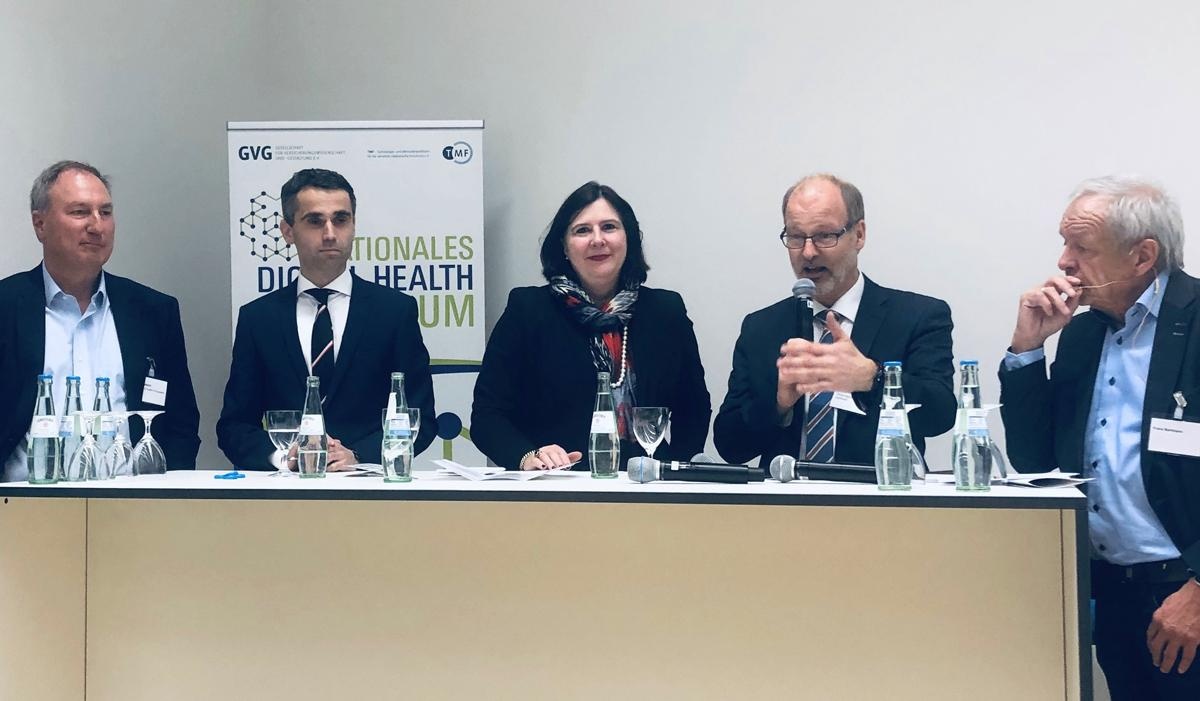
Focus on the learning healthcare system - panel discussion at the National Digital Health Symposium with, from left to right: Prof. Dr. Jürg Debatin, MBA (Health Innovation Hub), Priv.-Doz. Dr. med. Peter Bobbert (German Medical Association), Prof. Dr. Claudia Schmidtke (Member of the German Bundestag, Federal Commissioner for Patient Affairs), Prof. Dr. med. Wolfgang Hoffmann, MPH (University Medicine Greifswald) and Franz Bartmann (moderator). © TMF
Press Contact
Joachim Nöhre
Phone: 030 8561123-32
E-mail: j.noehre@gvg.org
Stefan Rabe
Phone: 030 22 00 24 723
Mobile: 0173 6141663
E-mail: presse@tmf-ev.de
About GVG
The Society for Insurance Science and Design (GVG) represents the social security system in Germany. Since its founding in 1947, the GVG has been the central discussion forum for the continuous development of social security in theory and practice. Core areas of work include the development of consensus positions on current developments, important reform issues, and future challenges. Almost all relevant institutions in the field of social security are organized in the GVG.
Downloads
| Anhang | Size |
|---|---|
| Dr. Johannes Bittner (Bertelsmann Foundation): AppQ – Core Set of Quality Criteria | 899.09 KB |
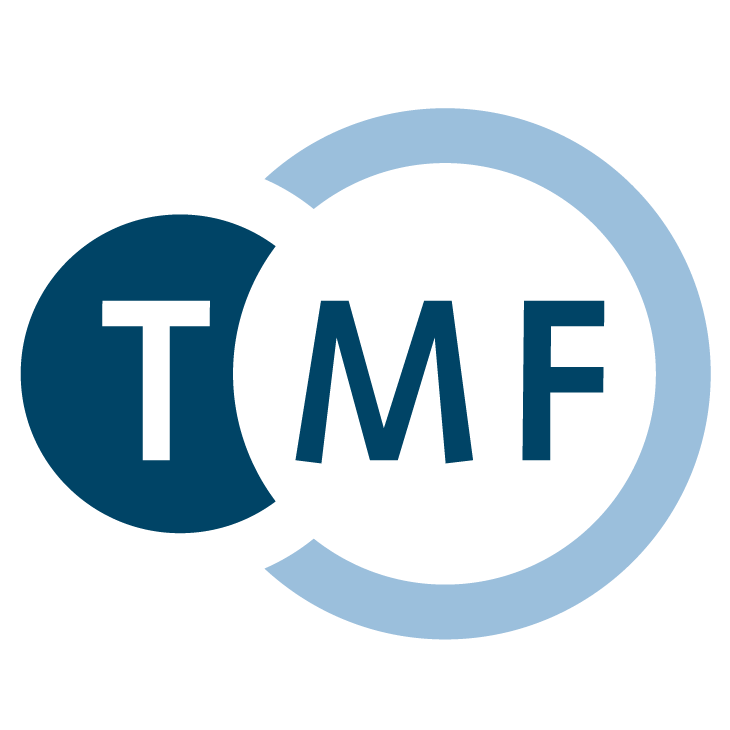
About the TMF
The TMF is the umbrella organization for collaborative medical research in Germany. It serves as a platform for interdisciplinary exchange and cross-project and cross-location collaboration, with the aim of jointly identifying and solving the organizational, legal, ethical, and technological problems of modern medical research. The solutions range from expert opinions, generic concepts, and IT applications to checklists, guidelines, training, and consulting services. TMF makes these solutions available free of charge and to the public.

